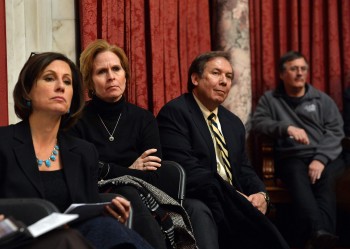
State lawmakers held a public hearing in the House of Delegates about the possibility of allowing public charter schools in West Virginia. Left to right are Lisa Grover of Albuquerque, NM, the senior director of state advocacy of the National Alliance for Public Charter Schools, Kim Nelson of Charleston, a mother of three children who all went to Kanawha County schools, Fred Albert of Charleston, the Kanawha County local president of the American Federation of Teachers, and in the background, Steven Perdue of Clarksburg, who is a representative for Sheet Metals Local 33.
CHARLESTON, W.Va. — Plans to make West Virginia the 43rd state to allow public charter schools were debated Wednesday during a legislative hearing at the state Capitol.
Since taking control of the Legislature, Senate and House Republicans have come out in favor of lifting West Virginia’s ban on charter schools, but many within the state’s teaching community have criticized the move, saying it would be detrimental to special needs and low-income students and create a disparity in public education spending.
Christine Campbell and Dale Lee, state presidents of the American Federation of Teachers and the National Education Association, respectively, have both opposed charter schools. On Wednesday, they said the school innovation zones approved by the Legislature last year need more time to work.
A school that receives an innovation zone designation is given additional support and flexibility to bypass policy or code to enhance student achievement.
While they are granted some of the same freedom a charter school would receive, innovation zone schools are only permitted to make smaller changes.
A charter school, in essence, is a publicly funded private school exempt from certain state and local regulations. While they have more flexibility in creating programs, hiring staff and adopting a curriculum, they must still adopt and follow state-approved academic standards.
While there are conflicting studies on whether charter school-enrolled students do better academically than their public school counterparts, the notion of offering an alternative to public education has grown in popularity…






